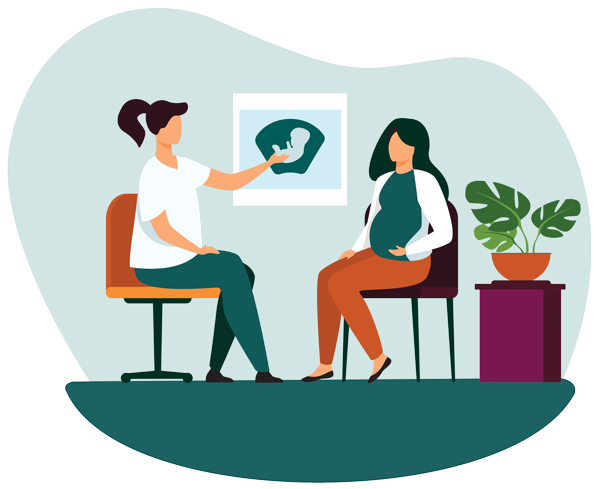Abdominal Aortic Aneurysm

Abdominal Aortic Aneurysm Ultrasound
An AAA Screening, or Abdominal Aortic(Aorta) Aneurysm Ultrasound, is a straightforward, pain-free test that examines the abdominal area through imaging.
London Private Ultrasound (LPU) provides abdominal aorta aneurysm (AAA) ultrasound screenings for both male and female patients aged 18 and above. Notably, men above 65 are more frequently diagnosed with this aneurysm.
Frequently Asked Questions:
What is an Abdominal Aortic Aneurysm | AAA Screening?
The aorta, the body’s primary artery, extends from the heart through the abdomen, transporting blood from the heart throughout the body.
Occasionally, a potentially dangerous bulge or swelling, known as an aneurysm, forms in the aorta. As AAAs often display no noticeable symptoms, they can go unnoticed for extended periods.
Our AAA screening program is designed to detect and track these aneurysms early on.
What is aneurysm?
An aneurysm is an abnormal bulging or swelling in the wall of a blood vessel, usually an artery. It occurs when the vessel wall weakens, allowing it to balloon out. If left untreated, an aneurysm can rupture, leading to internal bleeding and potential life-threatening complications. The most common locations for aneurysms are the abdominal aorta and the brain.
Can an aneurysm occur in other parts of the body?
Yes, an aneurysm can occur in any blood vessel in the body, though some locations are more common than others. In addition to the abdominal aorta and the brain, aneurysms can also occur in the following areas:
- Thoracic aorta – the section of the aorta that runs through the chest.
- Peripheral arteries – these include the popliteal artery in the leg, the femoral artery in the groin, and the carotid artery in the neck.
- Mesenteric arteries – the arteries that supply blood to the intestines.
- Renal arteries – the blood vessels that supply the kidneys.
It’s important to note that the risk, symptoms, and treatment options can vary depending on the location and size of the aneurysm.
When should you get screened for an AAA?
In the UK, men are automatically offered an AAA screening when they reach the age of 65 since they are the most susceptible to this condition.
Other individuals who might be at a higher risk for AAA are:
- Those with a family history, such as a parent, sibling, or child with an AAA.
- Individuals with hypertension.
- Current and former smokers.
Though men under 65 and women generally have a lower risk of an AAA, if you have concerns and haven’t been recommended for a scan, it’s possible to request one.
Why is it necessary to get an ultrasound scan for an abdominal aortic aneurysm?
AAA’s main cause isn’t clear, and most people don’t feel any symptoms. But some things might make you more likely to have it: being overweight, high blood pressure, smoking, high cholesterol, being a man, and being over 65.
Some people with a really big AAA might feel:
- Strong pain in their back or belly
- A beating feeling in the middle of their belly
- A fast heartbeat
- Feeling like throwing up
- Sweating a lot
- Feeling very weak or dizzy
If you have these feelings, it’s a good idea to get an AAA ultrasound to check things out.
What does the abdominal aortic aneurysm ultrasound scan include?
In this ultrasound, here’s what we’ll do:
- Check the Abdominal Aorta and some important arteries (like the Common iliac, External and Internal iliac, and Common femoral).
Ask about your medical history. - Talk with you for 10 minutes.
- Tell you what we see during and after the scan.
- Send you an official report with pictures within a day.
Suggest another scan later if we need to. - Offer GP or specialist referral and a Blood Test if needed
What are the benefits of AAA screening?
The benefits of AAA (Abdominal Aortic Aneurysm) screening include:
- Early Detection: Screening can identify an AAA before it becomes a significant health risk.
- Prevention: If an AAA is detected early, it can be monitored or treated to prevent rupture, which can be life-threatening.
- Peace of Mind: For those at risk, knowing they do not have an AAA can provide significant relief.
- Non-invasive: The ultrasound scan used for screening is painless and does not involve any radiation.
- Quick Results: The screening process is quick, often taking less than 30 minutes, and results are typically available immediately or within a short time frame.
- Tailored Follow-Up Care: If an AAA is detected, a care plan can be tailored to the individual’s needs, which might include regular monitoring or surgical intervention.
- Reduction in Mortality: Regular screening and early detection have been shown to reduce the number of deaths from ruptured AAA.
- Cost-Effective: Detecting and treating an AAA before it ruptures can be less costly than the extensive care required after a rupture.
- Increased Awareness: Individuals who undergo screening become more aware of their cardiovascular health and may be more likely to make lifestyle changes to reduce other heart-related risks.
- Potential for Early Intervention: If a sizable AAA is detected, timely interventions like surgery can be planned to fix the aneurysm before it becomes an emergency.
How is an Abdominal Aortic Aneurysm (AAA) Ultrasound Screening Conducted?
- You’ll lie down on a table, facing up.
- We’ll put a cool gel on your belly. This helps our machine see inside better.
- We use a small tool, kind of like a microphone, and move it over your belly. This tool shows pictures of your aorta on a screen.
- We look at these pictures to see if everything looks okay with your aorta.
- After, we wipe off the gel and you’re good to go!
- A doctor will look at your pictures and let you know how it went. If there’s anything unusual, we’ll guide you on what to do next.
Preparation for this ultrasound scan?
There is no particular type of care required after a Abdominal Aortic Aneurysm | AAA Screening ultrasound. You may resume your regular diet and daily activities unless your doctor advises you differently.
There are no confirmed adverse biological effects on patients or instrument operators caused by exposures to ultrasound at the intensity levels used in diagnostic ultrasound.
But depending on your particular results, the doctor may give you additional or alternative instructions after the procedure.
Abdominal Aortic Aneurysm
Checks for:-
Abdominal Aorta
-
Common iliac
-
External and internal iliac
-
common femoral arteries
-
Length of Abdominal Aorta
-
Location & Size of Aneurysm
-
Signs of inflammation
-
Lumps, Masses & Tumours
-
Abnormalities
-
Causes of Concern
10 Years of Experience
Our Medical Ultrasound specialists are fully qualified with more than 10 years of experience. They are accredited and registered with their respective governing bodies.
latest technology
Using the latest technology, We follow all local protocols and national guidelines to provide the best diagnostic ultrasound service in London.
No Waiting List
We offer urgent appointments with no waiting list. We also collaborate with Private GPs, Specialists, and an onsite Pathology Laboratory.
No need for Referral
We offer a professional and affordable private Ultrasound Scan Service, allowing you to self-refer without the need for any referral from your GP.

